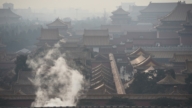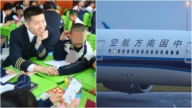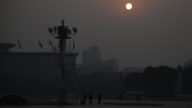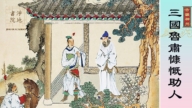【新唐人2012年1月10日讯】美国奥巴马政府宣布将美军战略重点向亚太地区转移,引起中共外交部和媒体强烈反应,连日来高调指责美国的新军事战略瞄准中国和伊朗。亚太地区关于领土主权的纷争和冲突一直持续不断,美国强调美军战略转移是为了维护亚太的安全与繁荣。
美国国防部1月5号公布新的国防战略报告,把重点转向亚太地区,并表示在财政紧缩背景下需要更谨慎的使用武力和制定适中的外交政策目标。
报告指出,美国必须有效反制中国、伊朗的反介入能力。中国的“反介入”通常是指以反舰导弹攻击美国航空母舰,阻止美国介入台海或南海冲突。报告还提到了伊朗和朝鲜的核威胁。
英国BBC指出,这是冷战后美国最大的战略调整。美国在战略报告中重新定义中国威胁,等于在亚太地区吹响了集结号,摆明着把中国作为最重要的敌人之一,让其他亚太国家看着办。
北京大学国际关系学院教授朱锋在接受BBC中文网的采访时说,这是自去年11月美国发动的“中国攻势”的延续。当时,奥巴马总统在APEC峰会上,强调亚太是美国未来全球战略的轴心。
中共外交部发言人9号反駮美国新战略报告中针对中国的指责。连日来中共媒体展开攻势,《环球时报》社论说,美国的战略调整提醒人们伊朗对中国的重要性。《新华社》国际时事评论说,亚太正处于谋求和平发展合作的时代,美国此举会扩散紧张氛围,加剧地区对武力的焦虑。
原“中国体改研究所”综合研究室主任程晓农表示,中共军事扩张才是亚太和平的威胁。
程晓农:“中国确确实实在亚太地区表现出了一种军事上的对外扩张的态势,就是中国不断的扩大海军,特别是开始引入航空母舰,谁都知道航空母舰是一种进攻性的海军武器,并不是防守性的。另外,中国在战略导弹的部署上,也在不断的试验怎么样能够对美国构成威胁,同时中国也在太空和美国进行争夺。”
《人民日报》7号发表海军少将杨毅的文章,杨毅指责美国是亚太安全的“麻烦制造者”。
时事评论员文昭表示,美国重返亚洲遏制了中共的扩张。而中国与周边国家的领土主权争端,历史久远,不是近期才有的。
文昭:“其实你看到的都是在意料之中的,包括它的一些媒体作一些指责性的评论。中国大陆它和周边国家有直接的领土主权的纠纷,比如说跟日本有钓鱼岛和东海的主权纠纷,跟越南、菲律宾等国家在南海的主权纠纷。”
德国波恩大学全球研究中心主任辜学武认为,鉴于中国将南海、台海、东海等领土争端,视为本国势力范围内的事务,反对外部力量介入,因此未来中美在亚太地区冲突的风险会增加。
辜学武:“包括南海问题比如说,很多小国都不希望再按照中国的方式‘搁置争议、共同开发’,把它推向未来。所以在这样一个背景下面,美国亚太战略调整把重心转向亚洲地区,会加剧中美之间未来冲突风险的程度,尤其是在台湾海峡地区,但现在比较明确的是在南海地区。”
清华大学当代国际关系研究院院长阎学通认为,未来中美关系将更趋紧张,双方的冲突也是不可避免的。美国新的战略报告则表示,美中两国必须建立合作关系,确保东亚和平稳定。
英国《卫报》评论指出,中美在21世纪冷战不是不可避免的,对民主、开放、价值、宗教信仰等价值观的根本差异,加上政治和经济上的竞争,或许最终会影响双方的合作。
新唐人记者常春、李元翰、李月采访报导。
The Obama administration’s announcement of a decision to
shift the U.S. military
focus to the Asia-Pacific (APAC) region has caused
strong reactions from Chinese Communist Party (CCP) media.
CCP media recently complained loudly that
U.S. military strategy is aiming at China and Iran.
With ongoing territorial sovereignty disputes and conflicts in
APAC, the U.S. stressed that
the shift of its military strategy is intended to safeguard
the security and prosperity of the APAC region.
On January 5, U.S. Department of Defense announced the
new national defense strategy report,
which states that shifting its focus to the APAC region,
being more careful with the use of force,
has the goal of developing moderate foreign policies in
the context of financial constraints.
The report states that the U.S. must effectively counter
China and Iran’s anti-access capabilities.
China’s “anti-access" usually refers to anti-ship missile attack
on U.S. aircraft carriers to stop U.S.’ involvement
in the Taiwan Strait or the South China Sea conflicts.
The report also mentions Iran and North Korea’s
nuclear threats.
The BBC points out that this is the most significant strategic
adjustment of U.S military strategy since the Cold War.
In the report, the U.S. re-defines China’s threat.
It is like blowing a gathering alarm, obviously noting
China as one of the most important enemies, and asking other APAC countries to decide for themselves.
Zhu Feng, professor of The Institute of International Relations
at Beijing University, said
during an interview with the BBC, this is a continuation of
the U.S.’ “Confront China” policy since November, 2011,
when Obama stressed during the APEC summit that
APAC is the future focus of U.S.’ global military strategy.
Jan. 9th of 2012, Spokesman of Chinese Regime refute in the
American new strategy report in view of China’s accusation.
Recently the CCP media started their attacks.
China’s Global Times published an editorial comment stating
that the U.S.’ adjustment of strategy is to remind people of
the importance of Iran to China.
Xinhua News Agency’s international department comments
that APCA is at a stage of peaceful development, and
that the U.S. strategy will spread tension and
concern over the possibility of war.
Former dean of The China Institute for Restructuring the
Economy Chen Xiaonong expressed the view that
the CCP’s military expansion is the real threat to
APAC’s peaceful development.
Chen Xiaonong: “China has indeed shown a trend of
expansion at APAC.
It keeps expanding its navy, especially with
the introduction of aircraft carriers.
Everyone knows that aircraft carriers are offensive,
not defensive, in nature.
In addition, China has been testing how to tackle the threat
from the U.S. in missile deployment.
Meanwhile, China is competing with the U.S.
over space travel.
People’s Daily published Chinese Navy Insignia Rear admiral
Yang Yi’s article on Jan, 7.
Yang Yi accuses the U.S. Of being a “trouble-maker”,
threatening the safety of the APAC region.
News commentator Wen Zhao expressed that the U.S.’s returning
to Asia is aimed at curbing China’s expansion.
China’s territory disputes with neighboring countries
have a long history. It is not a recent problem.
Wen Zhao: “In fact, what you see is to be expected,
in the media’s accusatory comments.
China and neighboring countries have territorial disputes,
for example, with Japan over the Diaoyu Islands and
East China Sea, and with Vietnam, the Philippines and
other countries over the South China Sea.
Gu Xuewu, dean of The Global Research Center at The
University of Bonn in Germany thinks that
given that China regards territorial disputes in the
South China Sea, Taiwan Strait, East China Sea and other areas as matters within China’s influence,
and is against the involvement of external forces, the risk of
conflicts between the U.S. and China will increase in the future.
Gu Xuewu says: “Take the conflicts in the South China Sea
for example,
many small countries no longer want to follow China’s strategy,
wanting to ‘settle disputes and to develop together.’
Under this circumstance, the U.S. has adjusted its strategy and
shifted its focus to Asia.
This will increase the risk of conflicts between the U.S.
and China, especially near the Taiwan Strait.
Currently the imminent issues are in the South China Sea.
Yan Xuetong, Dean of the Institute of Contemporary
International Relations of Qinghua University, thinks that
the U.S.-China relationship will likely be more tense in
the future, and that conflicts between the two are inevitable.
The new U.S. Strategic report shows that the U.S. and China must
establish cooperation to ensure the peace and security of East Asia.
The British Guardian commented that the Cold War between the
U.S. and China is inevitable in the 21st century.
The fundamental differences between the two nations are of
attitudes toward issues of democracy, openness, values, religion, etc.
In addition, political and economic competition may
ultimately affect their co-operation.
NTD reporters Chang Chun, Li Yuanhan and Li Yue



























